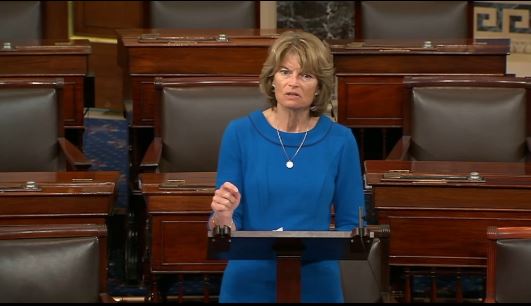Murkowski: Voting Against Costly, Impractical Green New Deal
Urges Focus on Practical Steps to Address Climate Change
U.S. Senator Lisa Murkowski (R-AK), Chairman of the Senate Energy and Natural Resources Committee, today spoke on the Senate floor in advance of a vote on the Green New Deal resolution. Murkowski explained the impracticality of the resolution and instead outlined the more practical, pragmatic steps Congress can take to reduce greenhouse gas emissions.
Murkowski highlighted areas where Congress has already made progress in supporting policies to reduce emissions, such as increased funding for the research and development of clean technologies, expanding the tax credit for carbon capture, utilization, and sequestration, and the passage of bills to promote emissions-free hydropower and nuclear energy.
Murkowski also focused on the need to do more to reduce domestic and global emissions by developing clean resources, including renewables, and announced plans to introduce a bipartisan bill for advanced nuclear reactor concepts. Murkowski called on her colleagues to lower the rhetoric and commit to bipartisan solutions that support innovation and promote efficiency.
CLICK HERE to watch the video.
Speech Excerpts:
- “Should it be a worthy goal to maximize our energy efficiencies within our buildings, within how we access our power? Absolutely. But would we be able to physically retrofit every building in America to maximize energy and water efficiency over the next ten years? I don’t believe that we can do that in ten years. So aspirations are good. Goals are good. But again, when you look at what has been specifically laid down in this Green New deal, it’s more than just transitioning to renewables or electric vehicles or greater energy efficiency. It calls for a federal jobs guarantee. It focuses on healthcare, education, wages, trade – a lot more.”
- “Let’s be honest with where we are and recognize the potential costs of this Green New Deal, whether you want to peg it in the price range of $50 trillion to $90 trillion over the next ten years.”
- “And while I like aspirations, I want us to make sure that we are not setting ourselves up for a situation where the expectation is not realistic. It is important for us to make sure that we don't distract from those pragmatic, practical solutions – that we don’t amp the rhetoric up so high that we can’t get ourselves to a place where we can work cooperatively, collaboratively to get to these solutions. Because if we’re going to address this in a meaningful way, it must be bipartisan. It must be enduring.”
- “In Alaska we’re at ground zero for climate change. The Arctic is warming at two to three times the rate of the rest of the world. We’re seeing glaciers retreat. Permafrost is thawing. We’re seeing sea levels rise. Wildlife, migration patterns are changing. We’re seeing different invasive species. We’re seeing ocean acidification. Villages are being threatened by coastal erosion and in need of relocation. For us, this is real.”
- “We have put policies in place over the course of years that are making a difference and will make a difference moving forward. So it’s not like we’re starting from scratch here. Just look at where we were last year. We expanded the tax credit for carbon capture utilization and sequestration. We increased funding for cleaner technologies. We passed legislation to promote basic science, nuclear energy, hydropower and more. Many of us support the production, the use, and export of clean-burning natural gas which can substantially help to reduce global emissions. So that was just last year in terms of those policies that we put in place that are moving us forward in the right direction.”
- “The only way we are going to be moving is if we move together. That’s what we’ve got to do here in Congress. We’ve got to take these policies that can keep us moving to lower emissions, to address the reality of climate change, to do so all the while that we are recognizing that we’ve got an economy that we need to keep strong, that we have vulnerable people that we need to protect, that we have an environment that we all care about—Republicans and Democrats. And it’s not just the environment in our states or our country, but it’s our global environment. How we’re working forward, together, is a priority—or should be a priority for us all. My hope is we get beyond the rhetoric, the high-fired rhetoric and we get to practical, pragmatic, bipartisan solutions.”









